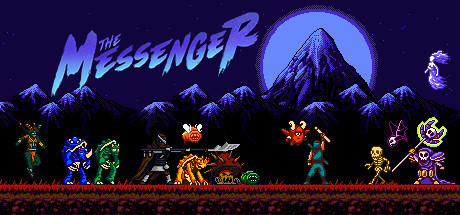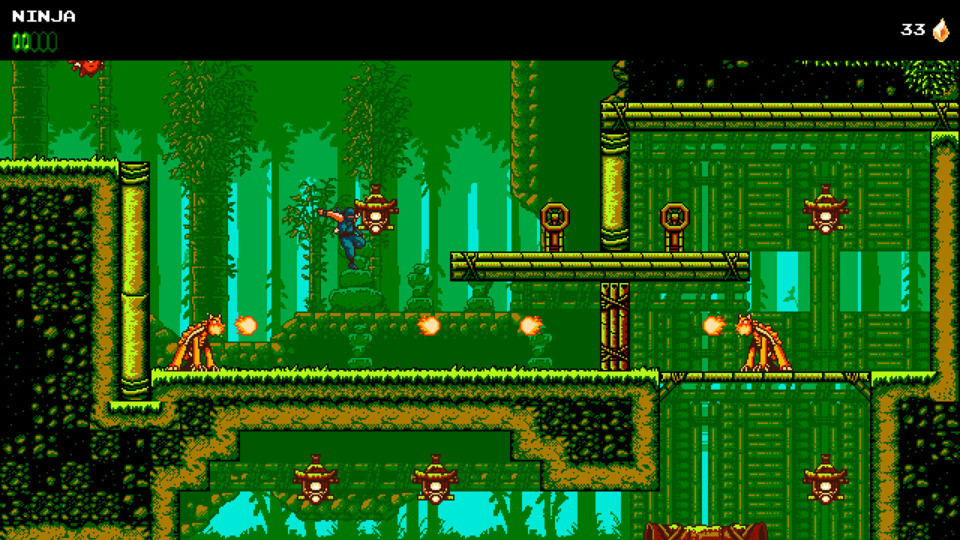Indie Game of the Week 100: The Messenger
By Mento 5 Comments

Here we are, the final Indie Game of the Week for 2018. It's Sabotage's The Messenger, a retro throwback side-scrolling action game heavily influenced by the original NES Ninja Gaiden and a little bit - though it's possible they were developed independently - by last year's Shovel Knight: Specter of Torment. A young ninja is chosen by a mysterious "western hero" to carry a scroll of utmost important to the peak of the tallest mountain in the land, braving the demon-infested wilds in-between. The game is not coy about its big upcoming meta twists, in part because the wily, fourth-wall breaking shopkeeper won't shut up about them, but the game actually has a couple of significant shifts so I'm reluctant to go too deep into how it shapes up towards the end. Instead, he's a brief spoiler-blocked synopsis: it goes 16-bit and calls it the "future". A few stages later, it turns from a linear NES platformer into a spacewhipper where you jump between time periods to solve item-based "prophecy" puzzles in stages old and new, like planting a seed in the past so you can reap a rare plant in the future.
Let's start off with what's good about the game: it has a great look and equally fantastic music. When the, uh... "shift" happens (sorry, it's hard to talk around it), the music goes from NES quality to Mega Drive quality, which is a remarkable feat of music design to make the same tracks work for both systems with the apposite instrumentation and sound chip quirks. It also finds a way to make those same tracks feel echoey and distant when underwater, which is a nice touch. I'm not the biggest fan of Mega Drive music, but even I have to admit it's a welcome change of pace when so many retro platformers go the alternate route with the SNES, or don't endeavor to make their 16-bit throwback music feel "Mega Drive-y" enough. You hopefully know what I mean by that: the system's music always had this sort of tinniness that, for better or worse, instantly made it obvious which system that game was on. It's remarkable how much better the game looks after the, uh... shift, though there's a certain scrappy appeal to the 8-bit stages and the way they had to get a little imaginative to set them apart from one another with that system's limited palette.
The game also plays well, which brings me back to the Specter of Torment comparison I made earlier. Though you learn new abilities as you proceed with the game, you start with a skill where you can double-jump but only after attacking something: either an enemy or one of the many Castlevania-style hanging lanterns. This leads to a lot of sequences where you need to get over a pit or move up a vertical area by hitting something, jumping, hitting something again, jumping again, and so on until you get to where you need to go. Further abilities build on this further, like a pair of claws that let you climb walls, a rope dart that lets you latch onto walls or launch yourself horizontally after hitting enemies or lanterns, or a wingsuit to let you glide slowly downwards. There are also purchasable upgrades which include passives like health boosts to useful abilities like limited-use shuriken or a means of attacking enemies while in the wingsuit - the game never puts you in a situation where you'd need a purchased ability, just in case you weren't able to afford them, but they always prove useful. Of course, the game itself is quick to tell you how smart it is for not making purchased abilities mandatory.

Which brings us to the bad. The game's script is obnoxious, almost from start to finish. Oddly, the game itself - despite being a typically tough platformer in the vein of Ninja Gaiden - isn't nearly as bad, not to the same extent as a masocore game like Celeste from a couple of weeks ago (though, conversely, Celeste's script had so much heart and empathy that it almost mitigated its vindictive level design). Rather, it's the way the shopkeeper keeps lauding his secrets over the hero, treating him and the player like idiots for their inquiries, just because he happens to be the custodian of this big amazing twist that several games have already explored (including, off the top of my head, the Evoland series and Alwa's Awakening). Like, where do you get off sounding smarter than everyone else when you're the twentieth person to the same idea? Worse still is Quarble the imp: this little asshole shows up after you die for the first time, claiming he used his time-travel powers to save you at the last moment, and insists on taking a certain amount of currency from you as payment. He doesn't grab it from your total, however, but simply snatches them out of the air when you collect them from the level. Each death is followed by a sassy quote from this Stygian jerk, and it regularly comes at the worst time. In one of the later levels, some intense weather-related visual effects caused no small degree of lag on my lousy laptop which made a particularly difficult sequence of jump-attack-jump-attack even more so. After dying for what felt like the fiftieth time, Quarble the Personable made some comment about "hey, you could always blame the input lag LOL". At that point I was considering buying one of those rare physical copies companies sometimes make of Indie games just so I'd have something in my hand that I could throw into a dumpster and set on fire. This tone is persistent throughout the game and overshadows the few good meta jokes the game has, or the entertaining dialogue between you and some of the game's other, better NPCs (I particularly like a pair of affable gym rat cyclopses who fight you as a tag team, one of whom has a ripped upper-body and the other a buff pair of gams).
If you're the type to quickly button mash through dialogue in action games because you simply don't care, then you're well set for The Messenger and its quality platforming. The twists are actually pretty fun, as lampshaded as they are, and I'm greatly enjoying the second half of the game with the ways it has restructured itself. I've no doubt it'll be in my shortlist for best music this year too. I just wish the snide talky parts and certain loathsome design choices like the sarcastic death tax gremlin didn't inspire so much antipathy.
Rating: 3 out of 5.
| < Back to 99: Minit | The First 100 | > Forward to 101: Life is Strange: Before the Storm |
